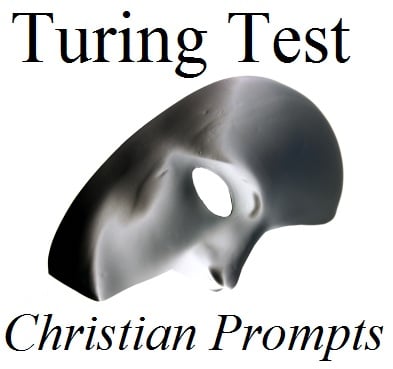This is the fourth entry in the Christian round of the 2013 Ideological Turing Test. This year, atheists and Christians responded to questions about sex, death, and literature.
Polyamory
The purpose of sacramental marriage is to bring people together in a complete union (that is, they become one) that will serve the purposes of mutual support, procreation and service to God. This provides all sacramentally married people with the kind of love and relationship-based care that enriches and fulfills their lives, and it ensures that future generations both exist and thrive in the context of a stable, lifelong parental relationship. This type of marriage is a natural institution based upon both human nature, as it is common to all of humanity, and on divine teleology, as most of us (with some exceptions for those who have taken vows of celibacy and others) are bound by the Bible and by our needs as humans to be fruitful and multiply and to bind with another person.
The kind of union that, by human nature and purpose, leads both to a romantic, stable relationship and the production of children is an exclusive union, one that is fidelitous romantically, sexually and emotionally, and lasts an entire lifetime. A nonfidelitous relationship, or one that ends, cannot be a sacramental marriage, because it is not the complete binding of people to each other; rather, it is partial or temporary. Furthermore, much as I struggle with this in the light of changing social mores, it does seem clear that a teleologically consistent view of human nature requires a union to be between a man and a woman; maleness and femaleness complement each other, and a union between them creates a relationship that encompasses the fullness of human qualities. Also, it is a union between a man and a woman that results in the creation of children.
So where does polyamory come in? By its nature, a polyamorous relationship involves more than one person of at least one sex, which does not serve the purpose of the creation of children, nor the purpose of binding people of differing human qualities. Further, polyamorous relationships that involve changing partners or adding partners is not a stable, fidelitous union. Only the case of group marriage or similar relationships come close, but while I will not do polyamorists, some of whom I call my friends, the dishonor of calling their relationships intrinsically more unstable, it does seem more likely that such relationships would disband.
While it is my understanding of God and His will for us that leads me to these conclusions, I think that through reason, anyone could come to the same understanding, based on human history and the properties of human nature that we can observe.
I have relatively few opinions about the role of civil marriage. Given that it is a civil institution, it should exist in the form that best serves the people and the state. Given the world we currently live in, it seems like a bad idea to allow polyamorous marriage. It would be enormously complex bureaucratically, it would allow for tremendous abuses and fraud, and human history has shown that polyamory generally means polygyny, in which one man has many female partners, which usually does not lead to a just and egalitarian society.
Euthanasia
It is never permissible to end a life. The argument generally given for euthanasia is that it prevents pain and suffering and is thus morally permissible. This argument assumes that the existence of pain and suffering in human life overrides the sanctity and dignity of human life, which it most certainly does not. Such an argument would make suicide not just morally permissible in some cases, but even obligatory, a morally abhorrent result. In fact, if this consequentialism is taken to its logical conclusion, there are cases in which killing someone who is in excruciating pain, even if they have not requested it, could be morally permissible. The only way to consistently advocate for life is to hold that the dignity and sanctity of life are inviolable. Older or disabled people have the same dignity and sanctity as anyone else, and their lives must be respected no less than that of anyone in any other stage of life. At no other time would we ever declare it morally permissible to kill someone simply because they are in pain, even if they request it. Holding the dignity of life constant across people means treating the elderly or disabled in precisely the same way.
The moral difference between intervening to kill and not actively extending life exists, but is small. In almost all cases, it is an absolute medical moral obligation to prevent death by any means necessary, whether active or passive. Restricting necessary medical care from a sick person which results in death is just as much murder as an overdose of morphine or a gunshot. However, if a person is a the very end of their life, having been given all of the necessary medical care up until that point, and an extension of their life would be unnatural (not in the sense that it doesn’t exist in nature, but as above, against the nature of humans) and/or would lead to an extension of life that was only minute and painful, there is no obligation (though it is not forbidden) to extend their life in such a way. An example of an unnatural act of this kind would be the freezing that is involved in cryonics, since this is an act intended to avoid death altogether, and thus defy God’s plan for us. An example of a minute and painful life extension would be a defibrillation that had occurred after several others that would lead to a pained few minutes. At that point, it is time for that person to die naturally and there is no obligation to extend their suffering further to no good effect.
You can vote on whether you think these answers were written by a Christian or an Atheist here. Comments are open to discuss the substance of the post and for speculation about the true beliefs of the author, so please vote before looking at the comments.













